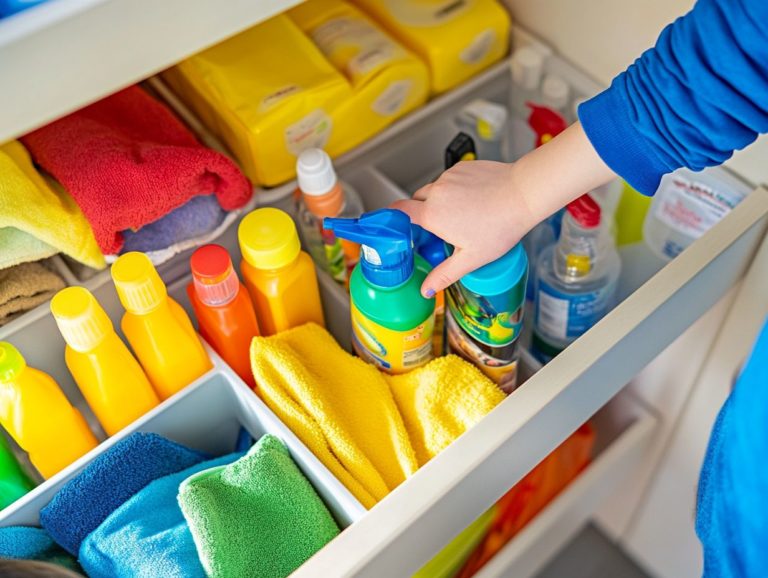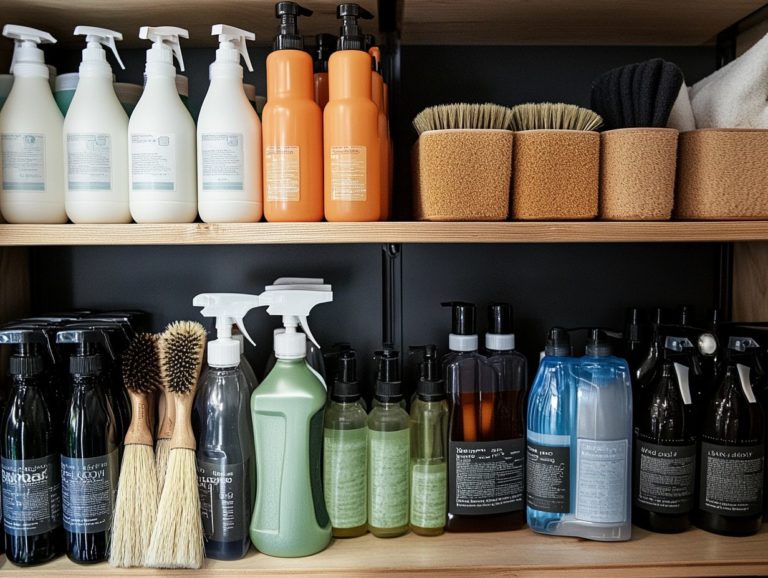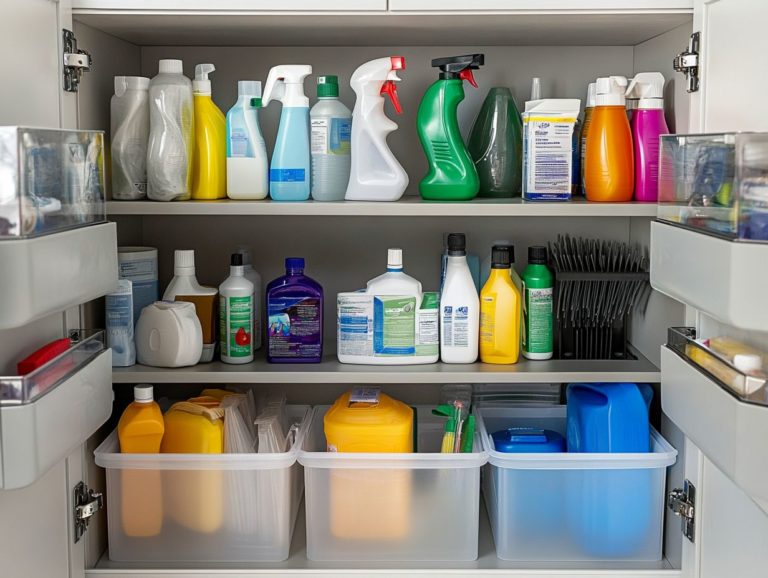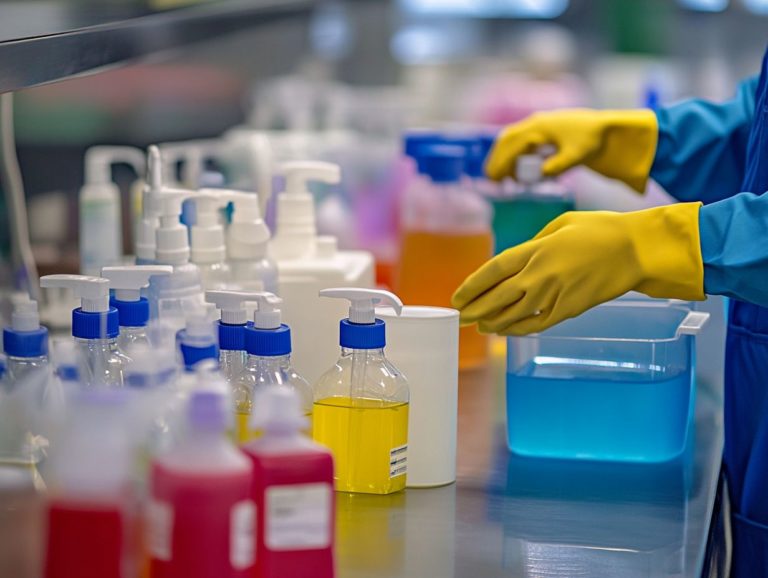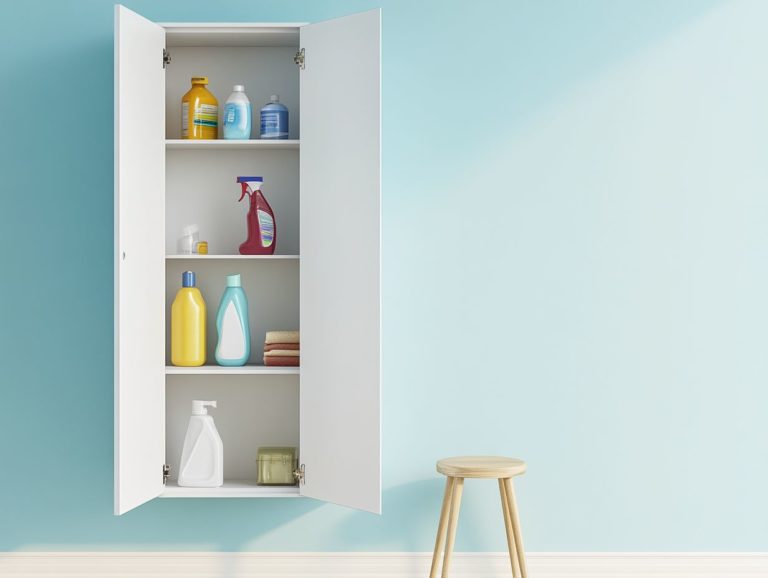The Best Shelf Life for Common Cleaners
Understanding the shelf life and expiration dates of cleaning products, including household cleaners and cleaning agents, is essential for fostering a safe and effective cleaning routine. Many individuals tend to overlook these crucial dates, which can lead to using cleaners that are either ineffective or potentially hazardous.
In this article, you’ll delve into the meaning behind shelf life and expiration dates. You’ll uncover the key factors that influence these dates and discover how long typical cleaners, like disinfectant wipes and glass cleaners, are designed to last.
Additionally, you’ll explore the signs that indicate a product has expired. You’ll also receive valuable cleaning tips on how to extend their usability, ensuring that your cleaning efforts are consistently effective.
Contents
- Key Takeaways:
- What Are Shelf Life and Expiration Dates?
- Why Is It Important to Know the Shelf Life of Cleaners?
- What Are the Factors That Affect Shelf Life of Cleaners?
- How Long Do Common Cleaners Last?
- 1. Bleach
- 2. Dish Soap
- 3. All-Purpose Cleaners (Household Cleaners)
- 4. Glass Cleaners (Natural Cleaning Products)
- 5. Toilet Bowl Cleaners (Disinfectant Wipes, Bleach)
- 6. Floor Cleaners (Carpet Cleaner, Air Fresheners)
- 7. Oven Cleaners (Aerosol Sprays, Gel Formulations, Non-Toxic Options)
- 8. Carpet Cleaners (Hydrogen Peroxide, Ammonia)
- How to Spot Expired Cleaners: Keep Your Supplies Effective!
- How Can You Extend the Shelf Life of Cleaners?
- Frequently Asked Questions
- What is the recommended shelf life for common cleaners?
- What factors can affect the shelf life of common cleaners, including all-purpose cleaner and hydrogen peroxide?
- How can I tell if a common cleaner has expired?
- Can I still use a common cleaner past its expiration date, such as disinfectants or air fresheners?
- How can I extend the shelf life of my common cleaners?
- Are there any natural alternatives to common cleaners like vinegar, baking soda, and lemon juice with a longer shelf life?
Key Takeaways:
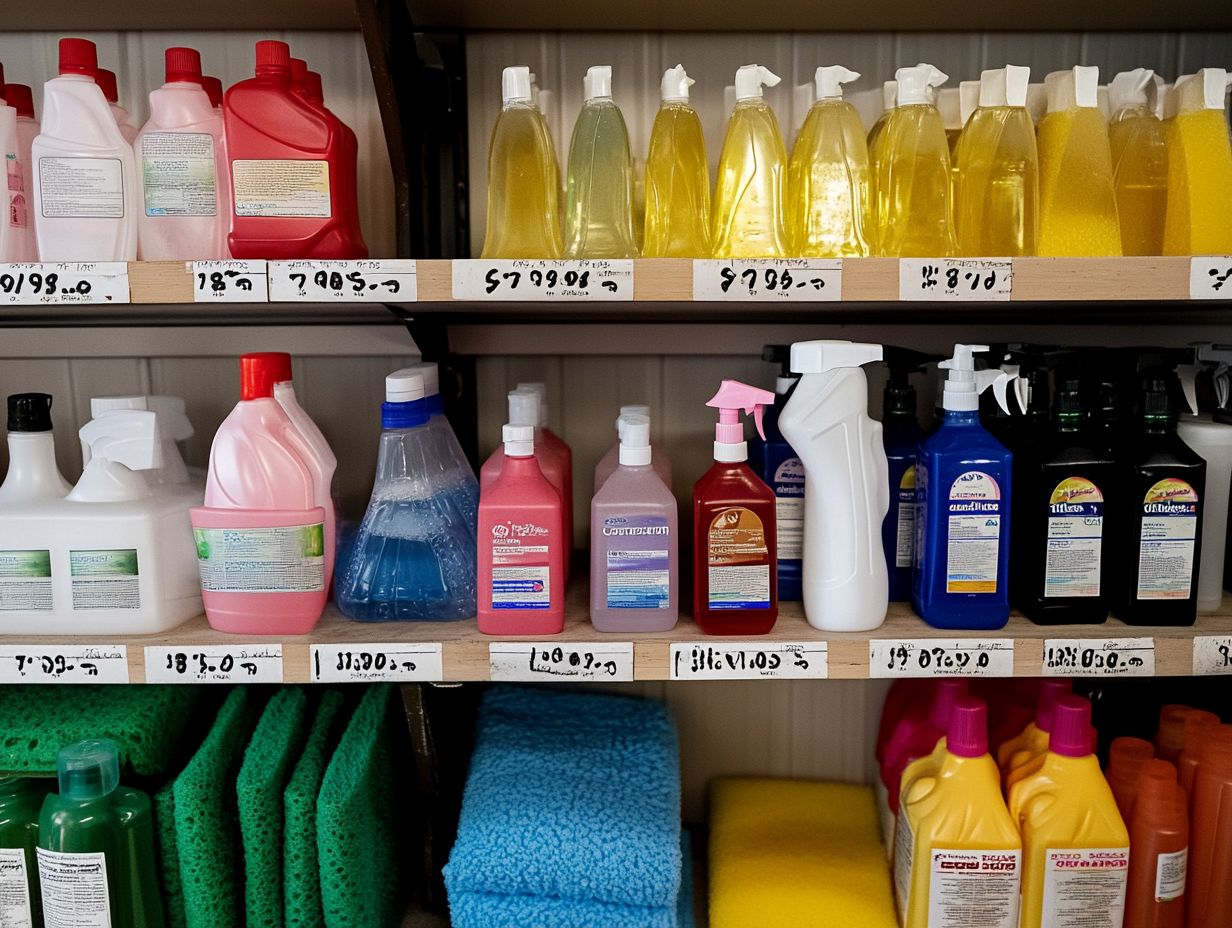
- Properly stored cleaners, including natural cleaning products, can have a longer shelf life and be effective for a longer period of time.
- Using cleaners for their intended purpose and following manufacturer instructions can ensure their effectiveness and prolong their shelf life, enhancing the overall cleaning process.
- Packaging, ingredients, and storage conditions all play a role in determining the shelf life of cleaners, such as carpet cleaner and air fresheners.
What Are Shelf Life and Expiration Dates?
Shelf life is the duration for which cleaning products, including household cleaners and agents like all-purpose cleaner and disinfectant wipes, remain effective before their effectiveness begins to diminish. Expiration dates, conversely, mark the moment when manufacturers can no longer vouch for a product’s effectiveness or safety a critical factor in upholding the cleanliness of your home.
By grasping the concepts of shelf life and expiration dates, you enable yourself to make informed decisions about the cleaning supplies you choose. This ensures that you are using products that deliver optimal results during your cleaning endeavors.
This knowledge can prevent the use of expired products that may not only lose their cleaning power but also affect health.
Why Is It Important to Know the Shelf Life of Cleaners?
Understanding the shelf life of your cleaning products is crucial for maintaining effective and safe cleaning routines. When you use expired items, you risk subpar cleaning results, which can compromise the cleanliness and safety of your home.
By being aware of shelf life, you can minimize waste and avoid relying on expired products. This ensures that you consistently have access to effective cleaning supplies, such as disinfectants and cleaning agents, that deliver both freshness and powerful cleaning capabilities.
Using expired cleaning agents not only fails to eradicate germs and dirt but may also pose health risks, as their chemical compositions can deteriorate into harmful substances over time. This degradation can lead to inadequate disinfection, leaving surfaces exposed to bacteria and viruses.
Some expired products might even cause respiratory issues or skin irritations upon contact. To keep your cleaning supplies in peak condition, consider establishing a rotation system, regularly checking expiration dates, and storing products in a cool, dry place.
This helps maintain freshness and ensures the cleaning power of your supplies. By prioritizing an organized and meticulous approach to household cleanliness, you ensure a safe and healthy living environment for yourself and your loved ones.
You can enhance the safety of your home by incorporating environmentally safe practices.
What Are the Factors That Affect Shelf Life of Cleaners?
The shelf life of cleaning products is shaped by a range of factors that dictate their effectiveness and safety over time. You should consider key elements such as the ingredients in the formulation, the protective packaging, and the storage conditions where your cleaners are kept.
Paying attention to these factors can help you manage the product lifespan more effectively. Understanding how these factors influence a product’s lifespan is crucial for you as a consumer.
It allows you to maximize the cleaning power of your products and ensures you avoid using anything that has expired. For instance, the use of natural cleaning products with plant-based ingredients can sometimes offer better stability.
Don’t let expired products compromise your health. Check your cleaning supplies today!
In conclusion, managing the shelf life and expiration dates of your cleaning products is vital for maintaining a safe and effective cleaning routine. Regular checks can ensure your supplies deliver optimal results.
1. Ingredients
The ingredients in your cleaning products are crucial to their shelf life and effectiveness. Substances like bleach, hydrogen peroxide, and ammonia have varying expiration dates. These compounds break down when exposed to light, air, or moisture.
Understanding the specific ingredients in your cleaning supplies helps you make informed decisions about their use and storage, ensuring you maintain their maximum cleaning power. For example, proper storage can significantly impact bleach effectiveness.
Bleach usually has a shelf life of about six months to a year, depending on its concentration and storage conditions. Hydrogen peroxide can lose potency within a few months if not kept in ideal conditions. Ammonia-based cleaners also require careful handling, as their effectiveness declines over time.
If you re considering eco-friendly alternatives, look for options that utilize plant-based ingredients. These often have better stability and longer shelf lives.
Being mindful of expiration dates on your cleaning products is essential for ensuring optimal performance and safety. This attention to detail helps you make smart choices and responsibly dispose of expired items, keeping your home clean and safe.
2. Packaging
The packaging of cleaning products is key to preserving their shelf life and effectiveness. Quality packaging acts as a shield against environmental factors that can lead to degradation. Choosing quality packaging helps maintain freshness and prevents contamination.
Improper packaging can hasten the early expiration of your cleaner. Being mindful of how packaging influences cleaning supplies is essential. Properly disposing of expired products also helps minimize your environmental impact.
To identify quality packaging, look for features like airtight seals, opaque materials, and tamper indicators. These signals indicate that the product is well-protected. Responsible packaging not only extends the efficacy of cleaning agents but also supports safe disposal practices.
Many manufacturers now include disposal guidelines directly on their labels. This makes it easier for you to understand how to discard products without harming the environment, thus promoting sustainability. Brands like Seventh Generation and Clorox provide detailed information on packaging for environmentally safe disposal.
Ultimately, making informed choices about packaging and disposal leads to a cleaner home and a healthier planet. This supports better homes and gardens by ensuring environmentally friendly practices.
3. Storage Conditions
Proper storage conditions play a crucial role in extending the shelf life of your cleaning products. You need to understand the best practices for keeping your supplies effective. Temperature, humidity, and light affect how well the cleaners work.
By following specific storage tips, you can maintain the freshness and prolong the life of your cleaning agents. Lauren Wellbank from The Washington Post emphasizes the importance of correct storage conditions for maintaining product efficacy.
The ideal environment for storing these products is a cool, dry space, ideally between 50 to 70 degrees Fahrenheit, with low humidity to prevent mold and degradation. Avoid placing these items near heat sources, like radiators or sunny windowsills. Direct sunlight can compromise their formulation.
Make sure to secure the lids tightly to prevent evaporation and contamination.
Protect your cleaning arsenal now to keep it potent and ready for any cleaning task! Don t wait until your cleaning supplies lose their power store them properly today!
How Long Do Common Cleaners Last?
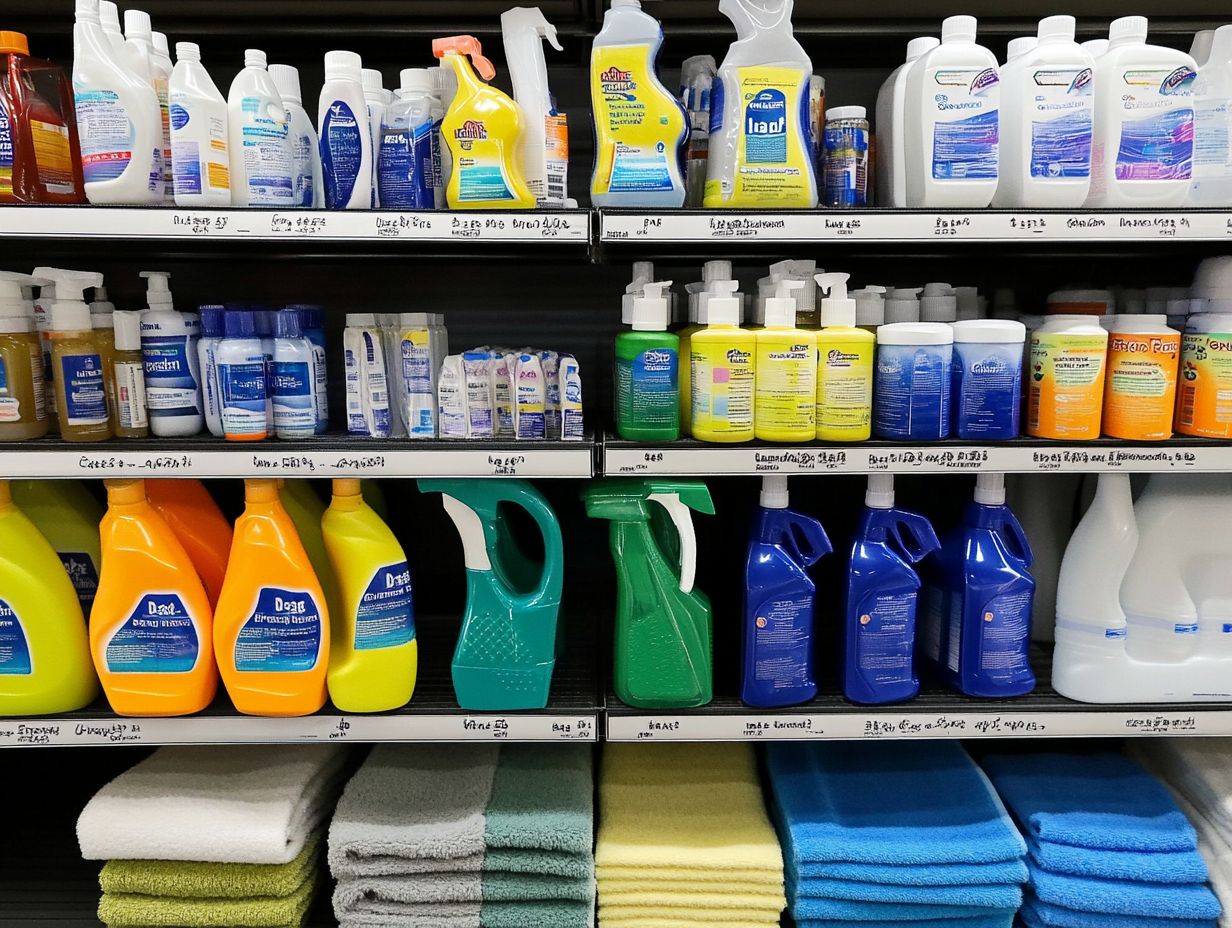
The shelf life of common cleaners can vary significantly depending on their ingredients and recipe, but having a grasp of their approximate longevity allows you to utilize these products effectively.
For example, bleach typically maintains its efficacy for about six months to a year, while dish soap can remain effective for two years or even longer. All-purpose cleaners and disinfectants often have shelf lives that range from one to three years, influenced by their ingredients and storage conditions. Pay attention to expiration dates to maximize cleaning effectiveness. Martha Stewart from Real Simple suggests checking product labels for specific storage tips to extend their usability.
1. Bleach
Bleach is a powerhouse disinfectant that you probably rely on in your home, typically boasting a shelf life of six months to one year when stored correctly. After that, its effectiveness may wane significantly. If it deteriorates, it won’t be able to zap away germs, stains, and odors effectively! Over time, bleach can break down into less effective compounds, which is why it’s vital for you to check the expiration date on the packaging to ensure it delivers optimal cleaning power. To keep your home safe and clean, always check the expiration date on your bleach!
Brian Sansoni from the American Cleaning Institute advises always checking the expiration date to maintain bleach effectiveness. Commonly found as sodium hypochlorite the active ingredient in bleach in liquid form, it serves a variety of purposes, from whitening laundry to sanitizing surfaces and even disinfecting drinking water in emergency situations. Brands like Clorox provide detailed guidelines on how to use bleach effectively for various purposes.
If you’re curious about its potency after the expiration date, you can simply mix a small amount of bleach with water and give it a sniff. A strong chlorine smell indicates it’s still effective, but a faint odor suggests reduced efficacy. Consider using eco-friendly alternatives to bleach for a safer cleaning approach.
To maximize its lifespan, store bleach in a cool, dark place away from sunlight, ensuring that your cleaning routine remains effective long after you make the purchase. By following these guidelines, you can maintain freshness and ensure the cleaning power of your bleach.
2. Dish Soap
Dish soap typically offers an impressive shelf life of two years or more, provided you store it correctly and keep it away from extreme temperatures. You should be vigilant about any changes in consistency or scent, as these could signal a loss of cleaning power, even before the expiration date. Factors such as exposure to sunlight, air, and moisture can significantly impact the longevity of these products. It s not merely about how long it lasts; the specific formulation whether it s a concentrated variant or one with added ingredients also plays a vital role in determining its efficacy over time.
If you notice a foul smell or an unusual color change, it s likely that the product no longer performs at its best. Therefore, it s essential to routinely assess the state of your dish soap to ensure you achieve effective cleaning during your dishwashing tasks.
3. All-Purpose Cleaners (Household Cleaners)
All-purpose cleaners typically boast a shelf life of one to three years, influenced by their specific formulation and how they are stored. As time passes, these household cleaners can gradually lose their cleaning efficacy, making it essential for you to check expiration dates to ensure they remain effective in your household cleaning routines.
You ll find a variety of all-purpose cleaners available on the market, ranging from those made with natural ingredients to enzymatic cleaners, disinfectants, and conventional chemical-based formulations. Each type comes with its own expiration timeline; for example, natural products often have shorter shelf lives due to the lack of synthetic preservatives. To determine whether a cleaner is still up to the task, watch for changes in appearance such as separation or discoloration as well as any unusual odors that might signal a breakdown of the formula.
Conducting a simple effectiveness test on a small area can be a wise move before you dive into larger cleaning projects.
4. Glass Cleaners (Natural Cleaning Products)
Glass cleaners, including natural ones, are effective for about two years if stored properly. Exposure to air and light can speed up their degradation.
Check the expiration date regularly to ensure you get that streak-free shine you desire. Store these products in a cool, dark place, away from sunlight and heat sources.
Effective cleaners often contain ingredients like ammonia, vinegar, or other special cleaning agents that help dissolve dirt and grime. A well-formulated cleaner not only enhances the clarity of your windows and mirrors but also leaves them dazzlingly clean.
5. Toilet Bowl Cleaners (Disinfectant Wipes, Bleach)
Toilet bowl cleaners, like disinfectant wipes and bleach, keep your bathroom hygienic and spotless. They usually have a shelf life of one to three years.
Over time, their effectiveness can wane, so keep an eye on expiration dates to ensure your cleaning products are up to the task. Using expired products risks ineffective cleaning and could create an unsanitary environment.
Make it a habit to check the packaging of your cleaners for a printed expiration date or a lot number. Watch for common signs that your toilet bowl cleaner has expired, such as changes in color or a distinct change in odor.
Make it a priority to regularly inspect your cleaning supplies to keep your toilet sparkling clean and inviting! Ensure they are stored properly and replenish them as needed for a welcoming and pristine space.
6. Floor Cleaners (Carpet Cleaner, Air Fresheners)
Floor cleaners usually have a shelf life of one to two years, depending on their formulation and storage conditions. To ensure you’re using effective products, check the expiration date regularly.
Look out for any changes in smell or texture. There are various types of floor cleaners available, including all-purpose cleaners, hardwood floor cleaners, specialized tile solutions, and carpet cleaner.
Each is designed to address specific surface materials and types of dirt. All-purpose cleaners are versatile, while hardwood floor cleaners contain special ingredients to preserve the finish of wood floors.
Understanding the specific requirements of each product significantly enhances your cleaning effectiveness. Stay alert for visual signs that indicate your cleaner has expired, such as ingredient separation or unusual color changes.
7. Oven Cleaners (Aerosol Sprays, Gel Formulations, Non-Toxic Options)
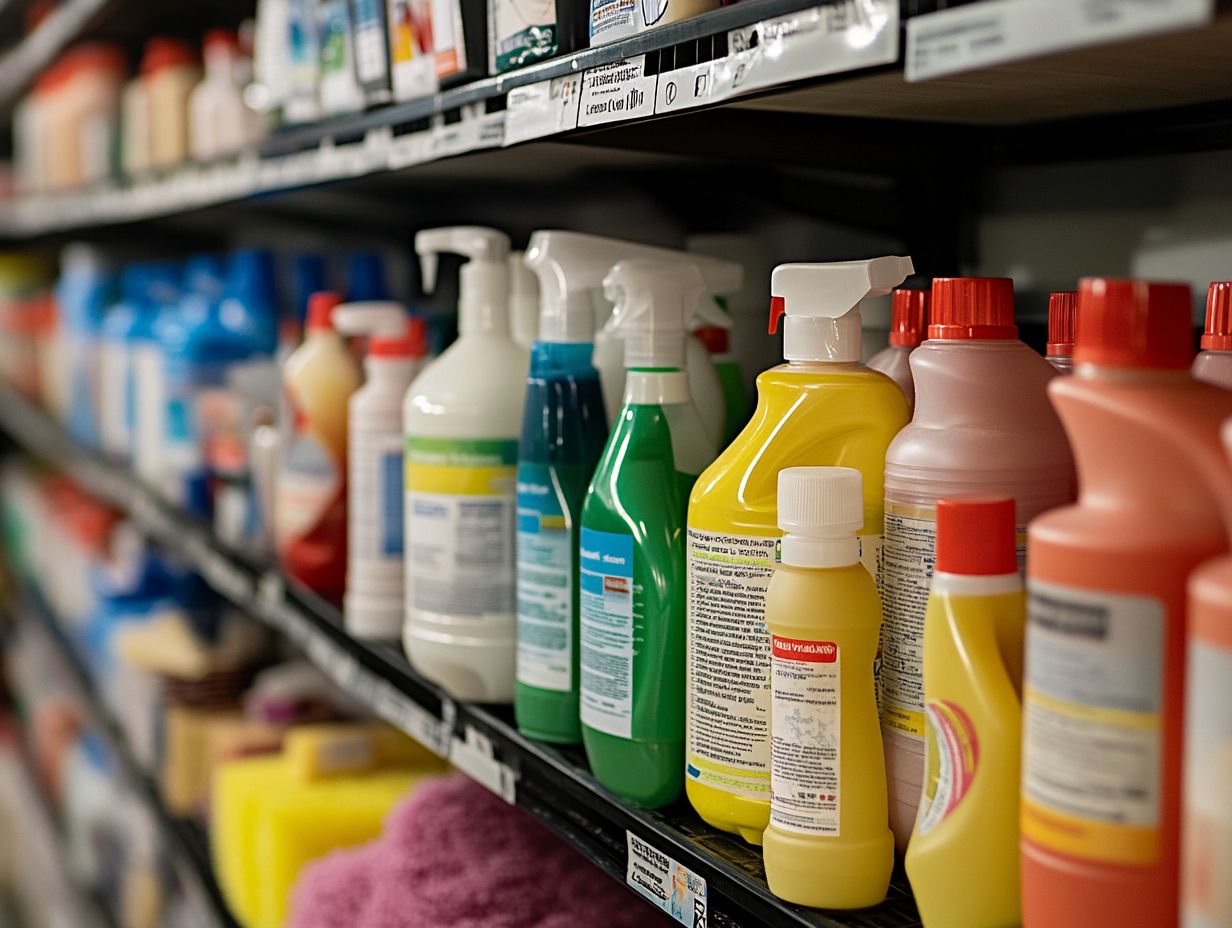
Oven cleaners, including aerosol sprays, gel formulations, and non-toxic options, typically have a lifespan of one to two years. However, their effectiveness can diminish if not stored properly. Make sure to check those expiration dates your oven deserves the best cleaning power!
There are various types of oven cleaners available, each designed to meet different needs. You can choose from aerosol sprays, gel formulations, or even non-toxic options if you’re concerned about harsh chemicals. Each type features its own unique active ingredients, like sodium hydroxide or citric acid, which are the chemicals that make the cleaner work to effectively break down burnt-on residues.
To maintain their effectiveness, store these products in a cool, dry place, away from direct sunlight. Always ensure the lids are tightly sealed after use. Regularly check for any discoloration or unusual odors to determine when it s time to replace your cleaner. This ensures your oven remains sparkling clean and free of stubborn stains.
8. Carpet Cleaners (Hydrogen Peroxide, Ammonia)
Carpet cleaners, which may contain hydrogen peroxide or ammonia, typically have a shelf life of one to two years. Maintaining their effectiveness hinges on proper storage and handling. Always be vigilant about expiration dates to ensure your cleaning products deliver optimal results in removing stains and odors from your carpets.
Consider the conditions in which these products are stored. Factors such as temperature, humidity, and exposure to direct sunlight can significantly impact the potency of your carpet cleaners. Experts like Brian Sansoni from the American Cleaning Institute highlight these storage practices.
To preserve effectiveness, store these cleaners in a cool, dry environment, away from extreme temperatures. If you find yourself in a humid climate, investing in airtight containers is a smart move to protect against moisture.
Don t forget to give the bottle a good shake before use; this ensures that the active ingredients are well mixed, enhancing overall performance. By following these easy storage tips, you ll ensure your cleaners stay powerful and effective. Publications like The Washington Post, Real Simple, and Better Homes & Gardens often emphasize these tips.
How to Spot Expired Cleaners: Keep Your Supplies Effective!
Recognizing the signs that a cleaner has expired is crucial for maintaining cleanliness and ensuring your cleaning products remain effective. Martha Stewart and Lauren Wellbank frequently highlight the importance of these practices in their cleaning routines. Stay vigilant! Spotting these signs early can save you from ineffective cleaning.
Look for common indicators like changes in color, texture, or scent, as well as a noticeable decline in cleaning power. If you notice any separation of ingredients or an unusual consistency, these clues suggest that the cleaner may no longer perform as intended. If you catch a whiff of a foul odor or notice a change in foaming action, it s definitely time to consider disposing of that product.
Regarding disposal, always adhere to local regulations regarding hazardous materials. Some cleaners require special handling at waste facilities. Being aware of these indicators not only promotes safety in your home but also contributes to a cleaner, healthier living environment.
How Can You Extend the Shelf Life of Cleaners?
You can extend their life by following a few key practices. Extending the shelf life of your cleaning products is crucial for preserving their effectiveness and maintaining their cleaning prowess over time. According to experts from Trumans and Seventh Generation, proper storage can significantly enhance product longevity. By storing them correctly, using each cleaner for its intended purpose, and adhering to the manufacturer s instructions, you can significantly maximize the lifespan of your cleaning supplies.
This ensures that they work well and enhances the overall efficiency of your cleaning efforts.
1. Proper Storage
Want to keep your cleaners working at their best? Proper storage is key! Proper storage of your cleaning products is one of the most effective strategies for extending their shelf life and maintaining their freshness. By keeping your cleaners in a cool, dry place, away from direct sunlight and extreme temperatures, you can help prevent the breakdown of the product over time and ensure that your cleaning supplies retain their intended effectiveness for as long as possible.
It s essential to categorize your items based on their composition, ensuring that products like bleach and ammonia are stored separately to avoid any unwanted chemical reactions. For liquid products, consider using clear, well-labeled containers to make it easier to locate the necessary supplies, streamlining your cleaning process. Incorporating natural cleaning products like those from Seventh Generation can also help reduce chemical hazards.
Organizing your products in a dedicated cabinet, away from areas with high humidity such as bathrooms or kitchens, further reduces the risk of deterioration. Regularly checking expiration dates and disposing of outdated products also plays a crucial role in maintaining an efficient cleaning regimen with popular brands like Clorox and Trumans, ensuring that only the most effective solutions are readily available when you need them.
2. Using Cleaners for Their Intended Purpose
Using cleaners for their intended purpose is essential for ensuring their effectiveness and extending their shelf life. Each cleaning product is carefully made to address specific tasks. When you use them outside of their intended applications, you risk diminishing their cleaning power and compromising safety, which can ultimately lead to the necessity of properly disposing of expired products.
Take, for example, a disinfectant spray; it s crafted to eliminate bacteria and viruses on hard surfaces, while a glass cleaner is specifically designed to leave your windows streak-free. Likewise, disinfectant wipes are convenient for quick clean-ups. By following the guidelines on the labels, you not only maximize the efficacy of these products but also protect yourself and others from potential hazards.
Understanding proper disposal methods is equally crucial. Some cleaners contain chemicals that require special consideration when it comes time to discard them. Carpet cleaners and air fresheners, for example, may have specific disposal requirements. Therefore, taking the time to read labels and comprehend the instructions paves the way for a more effective and responsible cleaning routine. Act now to ensure your supplies stay effective and safe for use!
3. Following Manufacturer Instructions
Following manufacturer instructions is crucial for maximizing the shelf life and effectiveness of your cleaning products. These guidelines provide recommendations on how to store, use, and check expiration dates, ensuring you have the knowledge needed to maintain the cleaning power of your supplies.
By adhering to these instructions, you can prevent issues such as reduced cleaning efficacy. You can also avoid potential hazards that arise from improper use. For example, if you neglect to mix a strong cleaner with water properly, you might end up with ineffective cleaning or even damage to your surfaces.
Likewise, ignoring storage recommendations like keeping chemical cleaners away from heat sources could lead to dangerous reactions. Refer to expert advice from sources like Martha Stewart, Real Simple, and Better Homes & Gardens for better cleaning tips.
Understanding and following the correct disposal methods for products, including certain disinfectants, can protect our planet and keep it clean! Consulting the American Cleaning Institute and experts like Brian Sansoni can offer valuable guidance. Ultimately, embracing these guidelines not only promotes safe cleaning practices but also ensures that your products perform as intended, making your cleaning process significantly more efficient.
Frequently Asked Questions
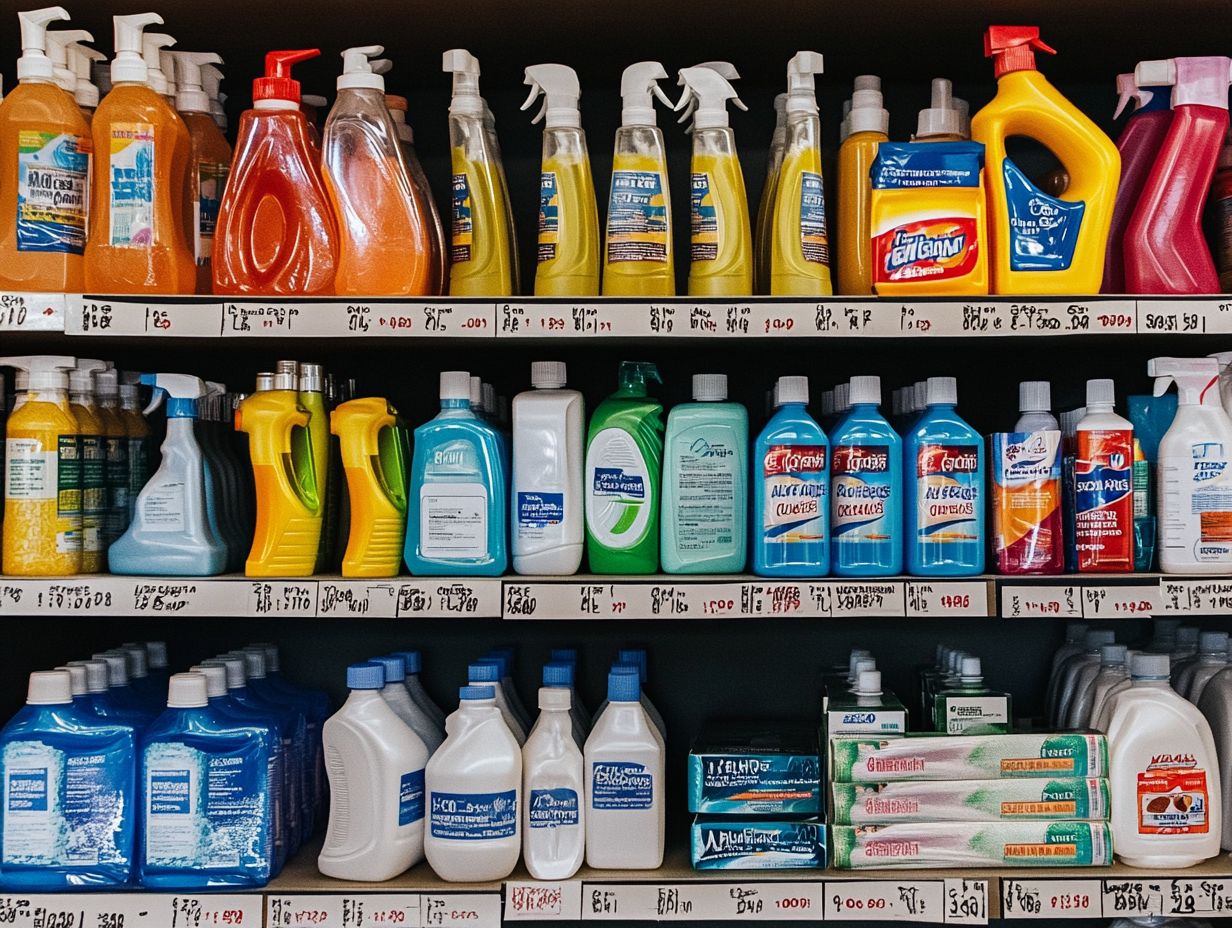
What is the recommended shelf life for common cleaners?
The recommended shelf life for common cleaners, such as those in The Washington Post’s cleaning guide, is typically 1-2 years from the date of purchase.
What factors can affect the shelf life of common cleaners, including all-purpose cleaner and hydrogen peroxide?
The shelf life of common cleaners can be affected by exposure to light, heat, and air. It can also be influenced by the type of packaging and how the products are stored.
How can I tell if a common cleaner has expired?
If a common cleaner has expired, it may show a change in color, consistency, or smell. It may also be less effective in cleaning or disinfecting. For instance, expired disinfectants may not kill bacteria and viruses effectively.
Can I still use a common cleaner past its expiration date, such as disinfectants or air fresheners?
It is not recommended to use a common cleaner past its expiration date as its effectiveness may be compromised. It is best to replace it with a new one.
How can I extend the shelf life of my common cleaners?
To extend the shelf life of common cleaners, store them in a cool, dry place away from direct sunlight. Keep them tightly closed and avoid exposing them to extreme temperatures. Also, consider using deep clean products periodically to maintain overall cleanliness and hygiene.
Are there any natural alternatives to common cleaners like vinegar, baking soda, and lemon juice with a longer shelf life?
Yes, there are natural alternatives to common cleaners such as vinegar, baking soda, and lemon juice that have a longer shelf life and can be just as effective in cleaning and disinfecting. These ingredients also have the added benefit of being non-toxic and environmentally friendly. Brands like Seventh Generation and methods like deep cleaning routines often recommend these natural ingredients.
Stay informed and keep your cleaning supplies effective check their shelf life today!

